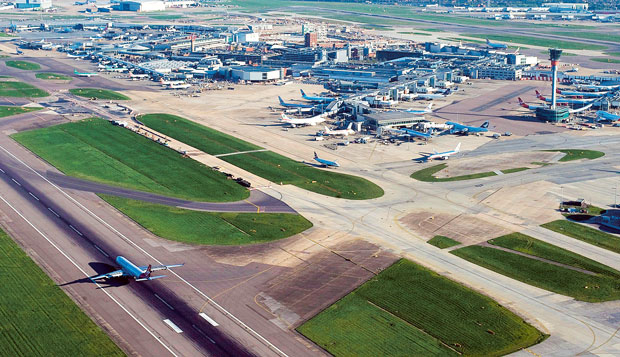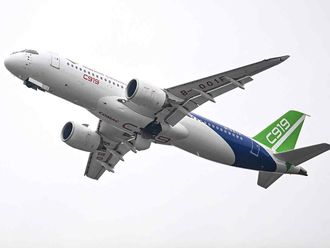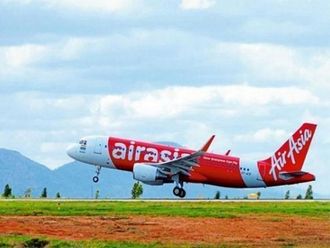
A new runway at Heathrow is likely to deliver significantly greater economic benefits to the UK than at Gatwick, although all options being considered by the government’s independent airports commission will cost billions more than previously estimated.
The findings come in a detailed assessment of the three shortlisted proposals — two at Heathrow and one at Gatwick — for relieving the crippling congestion at Britain’s main airports. The report is the latest update from the airports commission led by former CBI boss Sir Howard Davies, which triggers a 12-week public consultation process before a final recommendation is made after the general election next year.
The report found that all three options would be sufficient to meet the UK’s need for new airport capacity. But it is Heathrow, whether by extending an existing runway or by adding a third runway, which would deliver substantially greater economic benefits.
These are estimated at £112 billion-£211 billion for a new runway or £101 billion-£214 billion if the existing runway is extended. Benefits from expansion at Gatwick are estimated at £42 billion-£127 billion.
In Gatwick’s favour, the commission found that not only would its proposal be far cheaper, but significantly fewer people would be affected by noise than if Heathrow were extended.
The commission’s findings are likely to intensify the already heated political debate about airport expansion in the southeast of England, particularly given the vocal opposition of west London residents to the expansion of Heathrow. The west London airport is already running at full capacity and Gatwick is set to hit its limits in 2020.
It will raise concerns that the next government may abandon plans to expand airport capacity, yet again delaying a project that has been under consideration for more than 40 years.
Sir Howard said that the higher than expected costs would mean that each of the candidates would have to raise substantial amounts of equity and debt. This could mean “the government may have to consider whether it would have to facilitate that financing”, he said. But the report did not assume there would be government support, he added.
The commission put the cost of building a third runway at £18.6 billion, excluding government funding for improved road and rail links, against £14.8 billion estimated by Heathrow Airport Limited. Heathrow Hub, an independent consortium, is proposing the extension of an existing runway at a comparable cost of £10.1 billion, which the commission estimates at £13.5 billion. Gatwick, which is asking for a second runway, has priced its expansion at £7.4 billion, against £9.3 billion from the commission.
Heathrow’s expansion would also create the greatest number of jobs. However, the commission said these results should “should be interpreted with caution, given the innovative methodology used”.
Within hours of the report being published the campaigns to win public favour for the various options were in full swing. Each candidate was claiming some victory from the assessment.
The report showed that expansion at Heathrow, which has the support of big business, was “the only way to keep Britain at the heart of the global economy”, according to John Holland-Kaye, chief executive of Heathrow Airport Holdings.
Stewart Wingate, chief executive of Gatwick, said the assessment proved his airport was the “only deliverable option” given its lower environmental impact and noise disruption.
While Jock Lowe, head of the Heathrow Hub consortium, said: “Looking at the numbers, it is clear our option would add the least the existing landing charges and therefore we believe it is the easiest to finance.”
However the real concern for business and for airline carriers is whether the next government will press ahead with the final recommendation next year.
Sir Howard said he hoped the report would “provide an evidence base that will make it very difficult for a future government to duck the issue.”
But Willie Walsh, head of IAG — parent to British Airways and Iberia — said he was sceptical. “The politicians will not be brave enough to grasp this nettle,” he told members of the Airport Operators Association.
Paul Griffiths, chief executive of Dubai Airports — which his set to overtake Heathrow as the world’s largest international airport early next year — said the UK’s failure to expand its airport capacity was providing his group with the opportunity for aggressive expansion.
Sir Howard stressed that the commission was not favouring any of the proposals — or even one model for air transport over another. He stressed that the UK had to maintain flexibility in its airport capacity to allow either for the further growth in passengers transferring through large hub airports or for the development of point-to-point travel, favoured by the low-cost operators.
“We have never said we don’t need a hub; the issue is how big that hub should be and whether it should be biased towards the low-cost point-to-point EasyJet and Ryanair model, or towards the British Airways, American Airlines, KLM and Air France model,” Sir Howard said on Tuesday in an interview with the BBC’s Today programme.
“How they think the world will look in 20 years’ time is the tricky bit,” he added.
— Financial Times












